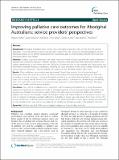| dc.contributor.author | Shahid, Shaouli | en_US |
| dc.contributor.author | Bessarab, Dawn | en_US |
| dc.contributor.author | van Schaik, Katherine D | en_US |
| dc.contributor.author | Aoun, Samar M | en_US |
| dc.contributor.author | Thompson, Sandra C | en_US |
| dc.date.accessioned | 2014-03-01T02:23:40Z | |
| dc.date.issued | 2013 | en_US |
| dc.identifier.citation | Shahid, Shaouli, Dawn Bessarab, Katherine D van Schaik, Samar M Aoun, and Sandra C Thompson. 2013. “Improving palliative care outcomes for Aboriginal Australians: service providers’ perspectives.” BMC Palliative Care 12 (1): 26. doi:10.1186/1472-684X-12-26. http://dx.doi.org/10.1186/1472-684X-12-26. | en |
| dc.identifier.issn | 1472-684X | en |
| dc.identifier.uri | http://nrs.harvard.edu/urn-3:HUL.InstRepos:11855716 | |
| dc.description.abstract | Background: Aboriginal Australians have a lower rate of utilisation of palliative care services than the general population. This study aimed to explore care providers’ experiences and concerns in providing palliative care for Aboriginal people, and to identify opportunities for overcoming gaps in understanding between them and their Aboriginal patients and families. Methods: In-depth, qualitative interviews with urban, rural and remote palliative care providers were undertaken in inpatient and community settings in Western Australia. Interviews were audio-recorded, transcribed verbatim and coded independently by two researchers with QSR NVivo 10 software used to help manage data. Data analysis was informed by multiple theoretical standpoints, including the social ecological model, critical cultural theories and the ‘cultural security’ framework. Thematic analysis was carried out that identified patterns within data. Results: Fifteen palliative care providers were interviewed. Overall they reported lack of understanding of Aboriginal culture and being uncertain of the needs and priorities of Aboriginal people during end-of-life care. According to several participants, very few Aboriginal people had an understanding of palliative care. Managing issues such as anger, denial, the need for non-medical support due to socioeconomic disadvantage, and dealing with crises and conflicts over funeral arrangements were reported as some of the tensions between Aboriginal patients and families and the service providers. Conclusion: Early referral to palliative care is important in demonstrating and maintaining a caring therapeutic relationship. Paramount to meeting the needs for Aboriginal patients was access to appropriate information and logistical, psychological and emotional support. These were often seen as essential but additional to standard palliative care services. The broader context of Aboriginal history and historical distrust of mainstream services was seen to impinge on Aboriginal people’s willingness and ability to accept care and support from these services. This context needs to be understood and acknowledged at the system level. More cultural safety training was requested by care providers but it was not seen as replacing the need for an Aboriginal worker in the palliative care team. | en |
| dc.language.iso | en_US | en |
| dc.publisher | BioMed Central | en |
| dc.relation.isversionof | doi:10.1186/1472-684X-12-26 | en |
| dc.relation.hasversion | http://www.ncbi.nlm.nih.gov/pmc/articles/PMC3729490/pdf/ | en |
| dash.license | LAA | en_US |
| dc.subject | Palliative care | en |
| dc.subject | End of life care | en |
| dc.subject | Aboriginal | en |
| dc.subject | Indigenous | en |
| dc.subject | Cultural safety | en |
| dc.subject | Australia | en |
| dc.title | Improving palliative care outcomes for Aboriginal Australians: service providers’ perspectives | en |
| dc.type | Journal Article | en_US |
| dc.description.version | Version of Record | en |
| dc.relation.journal | BMC Palliative Care | en |
| dash.depositing.author | van Schaik, Katherine D | en_US |
| dc.date.available | 2014-03-01T02:23:40Z | |
| dc.identifier.doi | 10.1186/1472-684X-12-26 | * |
| dash.contributor.affiliated | van Schaik, Katherine | |


